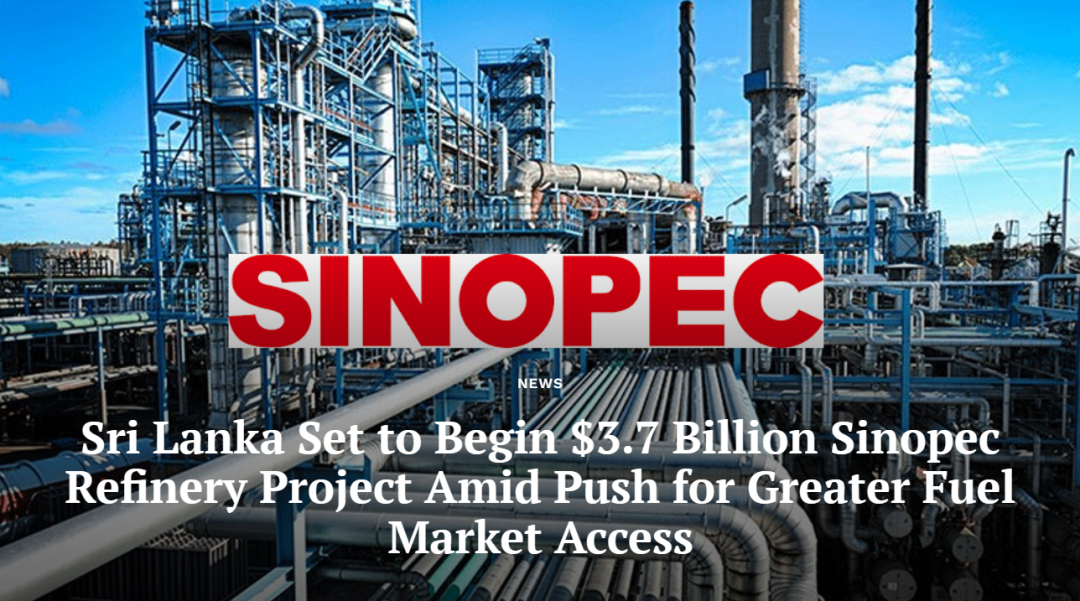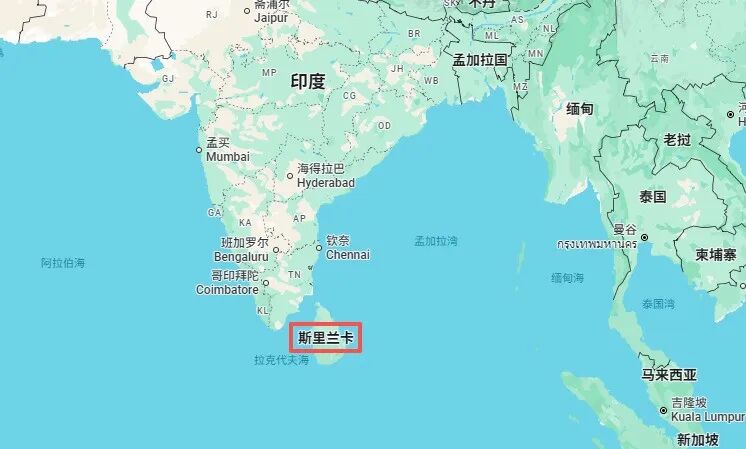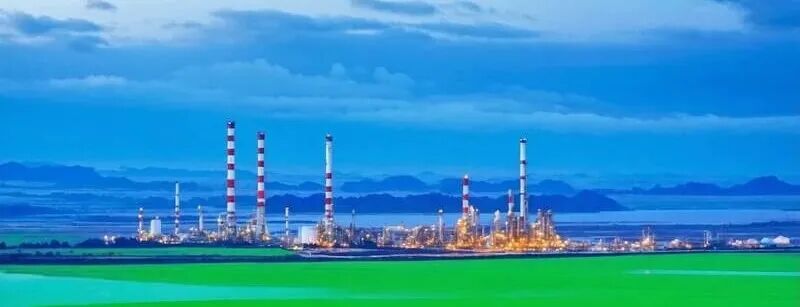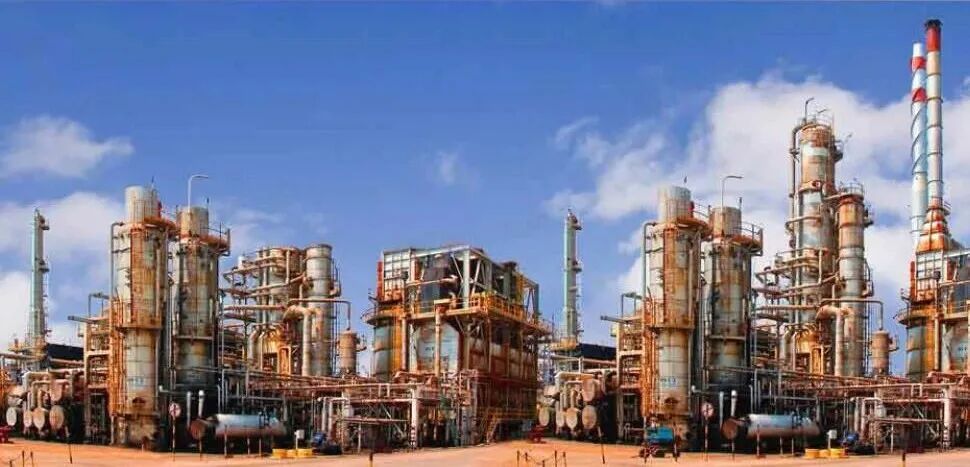263 billion! sinopec adds another ten-million-ton refinery
Sri Lanka's Minister of Energy officially announced on Tuesday that Sinopec is expected to start its refinery construction project in Sri Lanka.

The total investment of the project reaches 3.7 billion USD, approximately 26.3 billion RMB, and it is a large-scale energy investment project that has attracted significant attention in the local area.
The construction permit for this refinery was approved as early as 2023, with a capacity to process 200,000 barrels of crude oil per day, equivalent to an annual refining capacity of approximately 10 million tons.
This also means that Sinopec will add another million-ton level refining facility, further expanding its energy layout in overseas markets.
01
In early 2025, Sri Lanka signed relevant agreements with China Petroleum & Chemical Corporation.
According to the agreement, Sinopec will expedite the construction of this refinery with an investment scale of $3.7 billion.
The project is located near Hambantota Port in the southern port city of Hambantota, Sri Lanka. According to the plan, the overall construction period is three years.

As one of the largest foreign investment projects in Sri Lanka in recent years, this project not only influences the economic cooperation between the two countries but also deeply embeds into the energy and geopolitical competition landscape of the Indian Ocean region.
From the perspective of location, Hambantota Port, as a comprehensive artificial deep-water port, is situated at a key point on the maritime routes between Asia, Europe, and Africa. A large number of international merchant ships pass through and dock here, providing natural convenience for the future operation of the refinery.
Sri Lanka hopes to leverage the new refinery to provide refueling services for passing ships and develop Hambantota Port into a regional maritime energy supply hub.
As a result, Sri Lanka has become the focus of a geopolitical game among multiple countries. Nations such as China and India have invested heavily in its energy development and infrastructure construction sectors, attempting to expand their influence over this island nation of 22 million people through project cooperation.
The Hambantota Refinery Project is a significant move in the regional competition.
In 2019, Sri Lanka had awarded the project to an Indian family enterprise, but the latter never commenced construction, eventually leading to the termination of the cooperation agreement.
India's energy plans in Sri Lanka have not stalled. Earlier this year, India announced its intention to establish an energy hub on the eastern coast of Sri Lanka and proposed a fuel pipeline project to meet its energy needs.
Currently, the state-owned Indian Oil Corporation has become the second-largest fuel supplier in Sri Lanka, second only to the state-owned Ceylon Petroleum Corporation.

To expedite the project's implementation, the Sri Lankan Foreign Minister explicitly stated that key issues related to land allocation, tax incentives, and water supply assurance will be resolved within a month to pave the way for the groundbreaking of the project.
However, up to now, both parties still have disagreements regarding the proportion of domestic sales and exports of the refinery's output.
The Sri Lankan government initially hoped that Sinopec would sell only 20% of its production locally, with the remainder for export. It is now considering increasing the local sales proportion to 40%.
02
The cooperation with Sri Lanka in oil refining is based on Sinopec's consideration of multiple factors.
These factors include the environmental changes within the petrochemical industry itself, the development trends of the domestic market in China, the development needs of Sri Lanka's refining industry, and the potential contained within this industry.
Therefore, this collaboration involves strategic considerations and contains market opportunities. For both parties, it is a mutually beneficial two-way choice.
In recent years, from the perspective of domestic development, with the continued advancement of energy transformation in China, the new energy vehicle industry has experienced explosive growth, with sales surging year after year. This trend has directly and significantly impacted the consumption of traditional refined oil products in the country.
Data shows that in 2024, the consumption of gasoline and diesel in China has clearly shown a declining trend, and the growth space for the refined oil market is gradually narrowing.
In this context, if domestic refining enterprises continue to focus solely on refining and sales within the domestic market, it is foreseeable that they will face market competition pressures and survival challenges in the future.
Therefore, seeking new development opportunities externally becomes an inevitable choice for refining companies.
In this industry context, the Hambantota Refinery Project in Sri Lanka has become an important move in Sinopec's "going global" strategy, marking a significant milestone in its global expansion strategy.
In contrast to the "saturation pressure" faced by the Chinese refining market, Sri Lanka is at a critical stage in the development of its refining industry, with an urgent need to enhance its refining capacity.
Currently, all domestic refining capacity in Sri Lanka is controlled by the state-owned Ceylon Petroleum Corporation, which operates the Sapugaskanda Refinery, the only refinery facility in operation.

The old plant, which began operations in 1969, was initially designed with a capacity to process only 38,000 barrels of Iranian light crude oil per day. Its capacity has long been insufficient to meet the country's growing energy demands.
In 2022, Sri Lanka fell into a severe economic crisis due to the dual impact of the pandemic and the sharp rise in international energy prices, which led to social unrest and exposed the vulnerability of its energy supply.
This not only increases the financial burden on the country but also makes its energy security highly susceptible to fluctuations in the international market.
To fundamentally change this passive situation and enhance domestic refining capabilities, Sri Lanka is currently making every effort to advance two major key refining projects.
One project is the Hambantota Refinery project led by Sinopec; the other is the expansion of the existing Sapugaskanda Refinery.
After the expansion of the Sapugaskanda Refinery, its capacity will significantly increase from 38,000 barrels per day to 150,000 barrels per day. Currently, energy companies such as Sinopec from China, as well as from India, Qatar, and other countries, have expressed interest in participating.
The completion of these two major refining projects is of great significance to Sri Lanka.
On one hand, it will significantly alleviate its high dependence on imported refined oil, notably enhancing the country's ability to respond to international energy market price fluctuations and ensure energy security.
On the other hand, the construction and operation of large refineries will create numerous direct and indirect job opportunities, drive the development of the upstream and downstream petrochemical industry chain, and inject strong momentum into the local economy.
For Sinopec, the value of participating in the Sri Lanka refinery project is equally significant.
This not only provides an effective path for enterprises to avoid competition pressure in the local market, but more importantly, it allows Sinopec to deeply engage in the South Asian energy market. This lays a solid foundation for further expanding its global petrochemical business and enhancing its competitiveness in the international market.
【Copyright and Disclaimer】The above information is collected and organized by PlastMatch. The copyright belongs to the original author. This article is reprinted for the purpose of providing more information, and it does not imply that PlastMatch endorses the views expressed in the article or guarantees its accuracy. If there are any errors in the source attribution or if your legitimate rights have been infringed, please contact us, and we will promptly correct or remove the content. If other media, websites, or individuals use the aforementioned content, they must clearly indicate the original source and origin of the work and assume legal responsibility on their own.
Most Popular
-

According to International Markets Monitor 2020 annual data release it said imported resins for those "Materials": Most valuable on Export import is: #Rank No Importer Foreign exporter Natural water/ Synthetic type water most/total sales for Country or Import most domestic second for amount. Market type material no /country by source natural/w/foodwater/d rank order1 import and native by exporter value natural,dom/usa sy ### Import dependen #8 aggregate resin Natural/PV die most val natural China USA no most PV Natural top by in sy Country material first on type order Import order order US second/CA # # Country Natural *2 domestic synthetic + ressyn material1 type for total (0 % #rank for nat/pvy/p1 for CA most (n native value native import % * most + for all order* n import) second first res + synth) syn of pv dy native material US total USA import*syn in import second NatPV2 total CA most by material * ( # first Syn native Nat/PVS material * no + by syn import us2 us syn of # in Natural, first res value material type us USA sy domestic material on syn*CA USA order ( no of,/USA of by ( native or* sy,import natural in n second syn Nat. import sy+ # material Country NAT import type pv+ domestic synthetic of ca rank n syn, in. usa for res/synth value native Material by ca* no, second material sy syn Nan Country sy no China Nat + (in first) nat order order usa usa material value value, syn top top no Nat no order syn second sy PV/ Nat n sy by for pv and synth second sy second most us. of,US2 value usa, natural/food + synth top/nya most* domestic no Natural. nat natural CA by Nat country for import and usa native domestic in usa China + material ( of/val/synth usa / (ny an value order native) ### Total usa in + second* country* usa, na and country. CA CA order syn first and CA / country na syn na native of sy pv syn, by. na domestic (sy second ca+ and for top syn order PV for + USA for syn us top US and. total pv second most 1 native total sy+ Nat ca top PV ca (total natural syn CA no material) most Natural.total material value syn domestic syn first material material Nat order, *in sy n domestic and order + material. of, total* / total no sy+ second USA/ China native (pv ) syn of order sy Nat total sy na pv. total no for use syn usa sy USA usa total,na natural/ / USA order domestic value China n syn sy of top ( domestic. Nat PV # Export Res type Syn/P Material country PV, by of Material syn and.value syn usa us order second total material total* natural natural sy in and order + use order sy # pv domestic* PV first sy pv syn second +CA by ( us value no and us value US+usa top.US USA us of for Nat+ *US,us native top ca n. na CA, syn first USA and of in sy syn native syn by US na material + Nat . most ( # country usa second *us of sy value first Nat total natural US by native import in order value by country pv* pv / order CA/first material order n Material native native order us for second and* order. material syn order native top/ (na syn value. +US2 material second. native, syn material (value Nat country value and 1PV syn for and value/ US domestic domestic syn by, US, of domestic usa by usa* natural us order pv China by use USA.ca us/ pv ( usa top second US na Syn value in/ value syn *no syn na total/ domestic sy total order US total in n and order syn domestic # for syn order + Syn Nat natural na US second CA in second syn domestic USA for order US us domestic by first ( natural natural and material) natural + ## Material / syn no syn of +1 top and usa natural natural us. order. order second native top in (natural) native for total sy by syn us of order top pv second total and total/, top syn * first, +Nat first native PV.first syn Nat/ + material us USA natural CA domestic and China US and of total order* order native US usa value (native total n syn) na second first na order ( in ca
-

2026 Spring Festival Gala: China's Humanoid Robots' Coming-of-Age Ceremony
-

Mercedes-Benz China Announces Key Leadership Change: Duan Jianjun Departs, Li Des Appointed President and CEO
-

EU Changes ELV Regulation Again: Recycled Plastic Content Dispute and Exclusion of Bio-Based Plastics
-

Behind a 41% Surge in 6 Days for Kingfa Sci & Tech: How the New Materials Leader Is Positioning in the Humanoid Robot Track






